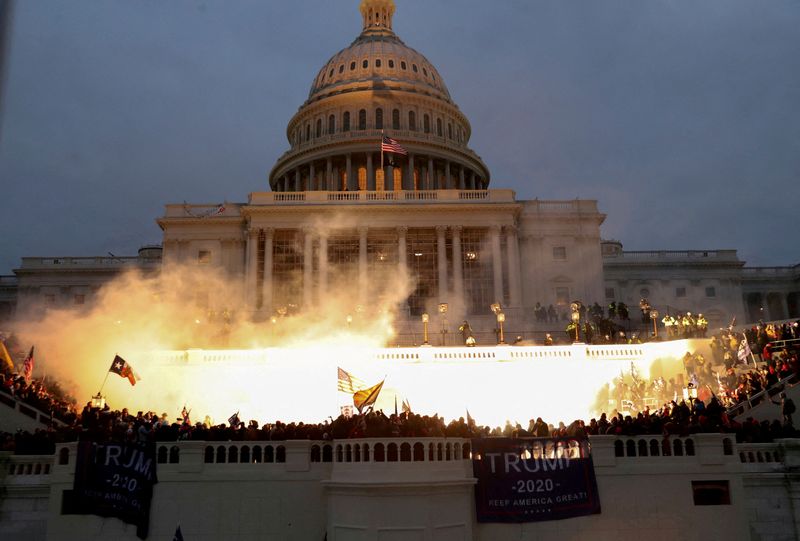More than 100 US Capitol rioters’ sentences could be shortened, under court ruling
2/2

FILE PHOTO: An explosion caused by a police munition is seen while supporters of U.S. President Donald Trump gather in front of the U.S. Capitol Building in Washington, U.S., January 6, 2021. REUTERS/Leah Millis/File Photo
2/2
By Jonathan Stempel
(Reuters) – More than 100 people convicted of joining the Jan. 6, 2021, assault on the U.S. Capitol by Donald Trump’s supporters could have their sentences shortened, following a federal appeals court ruling on Friday.
The U.S. Court of Appeals for the District of Columbia said defendants who were implicated in obstructing the work of the U.S. Congress should not have been given longer sentences for having interfered with the “administration of justice.”
Friday’s decision upheld the conviction of Larry Brock, a retired Air Force officer who wore combat gear and carried zip-tie handcuffs when he and others loyal to the former U.S. president stormed the Capitol, but required that he be resentenced.
The 3-0 decision could also force district judges in Washington, D.C. to recalculate and perhaps shorten sentences for other rioters charged with felony obstruction.
In an email, the U.S. Department of Justice declined to comment on the decision, but said more than 100 defendants’ cases could be affected. Brock’s lawyer did not immediately respond to requests for comment.
The U.S. Supreme Court will consider the felony obstruction issue next month, when it hears arguments on whether Jan. 6 rioters can be charged with obstructing an official proceeding.
A decision from that court could also affect Trump, who faces obstruction charges in the indictment accusing the Republican of plotting to remain in power despite losing the 2020 election to Democrat Joe Biden.
‘TEXTUALLY INDISPUTABLE’
Brock, 57, of Grapevine, Texas, was sentenced last March to two years in prison by U.S. District Judge John Bates, who had found him guilty in a non-jury trial on six criminal counts.
Federal sentencing guidelines recommend that judges apply the “administration of justice” enhancement to defendants who disrupt judicial proceedings.
Bates, however, agreed with some other judges on his court that its application could be broader.
Writing for the appeals court, however, Circuit Judge Patricia Millett rejected the Justice Department’s argument that Congress’ plan on Jan. 6, 2021 to certify the election results was the equivalent of a judicial proceeding.
The appointee of Democratic President Barack Obama said it was “textually indisputable” that the enhancement did not reach everything Congress does, or the administration of government, or administering laws generally.
“Brock’s interference with one stage of the electoral college vote-counting process–while no doubt endangering our democratic processes and temporarily derailing Congress’s constitutional work–did not interfere with the ‘administration of justice,'” Millett wrote.
The sentencing enhancement lengthened Brock’s prison stay by about nine months, his lawyer estimated. Brock is eligible for release in December, according to Federal Bureau of Prisons records.
The case is U.S. v. Brock, D.C. Circuit Court of Appeals, No. 23-3045.







